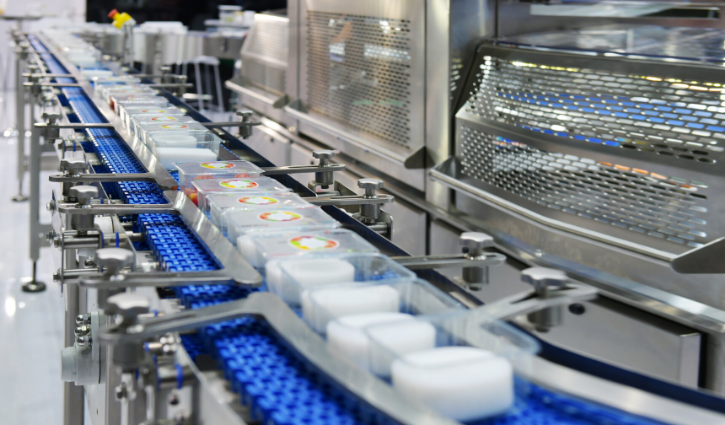“I’ve always believed – dating back to my consulting days – that there’s a tremendous amount of latent value at most organizations across the Supply Chain.” – Steve Diakowsky, President & CEO of Freshstone Brands.
Welcome to Argentus’ latest in our Executive Interview series! In this series, we interview senior executives from Argentus’ network about what’s happening in Supply Chain Management. It’s our chance to give our readers an up-to-the-minute look at the concerns, strategies and approaches from some of the leading lights in the field – and show off the tremendous depth of expertise that they bring to the table. Because we’re a recruitment agency specialized in Supply Chain, we’re always especially curious about leaders’ thoughts on talent related topics: key skills, hiring challenges, and strategies for attracting and retaining the best talent.
- Today, we’re thrilled to bring you our feature interview with Steve Diakowsky.
 Steve is the President and CEO of Freshstone Brands, an innovative prepared foods company servicing retail, foodservice and co-manufacturing. In his career, Steve has executed a number of visionary business transformations in Food Production and other industries – he’s a true superstar.
Steve is the President and CEO of Freshstone Brands, an innovative prepared foods company servicing retail, foodservice and co-manufacturing. In his career, Steve has executed a number of visionary business transformations in Food Production and other industries – he’s a true superstar.
Steve’s work sits at the intersection of transformation and the Food Production industry, two areas which have become a major point of focus for Argentus over the past 18 months. He’s also a great interview, so we were thrilled for the chance to catch up.
We spoke about:
- Steve’s background in business transformation, and how it led him into his career executing large-scale transformation in the food Industry.
- Particular challenges in the food industry, and how to overcome them.
- The massive amounts of value that companies can generate through Supply Chain transformation in particular.
- Some of Steve’s biggest transformative Supply Chain successes, and what the food industry can learn from other industries.
We hope you find the interview as informative as we did!
Thanks for taking the time to do this interview, Steve! Could you start by giving us a brief overview of your career background, including what led you to Food Production, as well as using large-scale business transformation to unlock innovation in companies?
Sure, absolutely. For all intents and purposes, I’m an accidental food guy. After grad school, I started my career as a management consultant. I was fortunate to work on large scale transformational projects, post-merger implementations, system implementations, and other projects that would change business and operating models to drive more efficiency, productivity and profitability.
As a consultant with KPMG at the time, my last client was Cadbury Adams Canada. I was leading the post-merger integration of Cadbury and Adams after Cadbury acquired Adams from Pfizer in 2003. It was after that engagement that I went “client-side” with the President of Cadbury Adams to join his executive team and finish the post-merger integration and business transformation play.
My passion for transformation really stems back to my days as a consultant. Back then, I first realized that there’s great value in being able to orchestrate complex organizational change within companies to drive improvement across all functions.
That Cadbury Adams transformation included a soup-to-nuts organization integration, Distribution Center consolidations, implementation of new ERP systems, and migration to a shared services model, which set the table for a very dramatic improvement in Cadbury Adams performance, growth and profit delivery.
After finishing that project, my team and I articulated a vision to simplify, focus and rationalize non-core brands, plants and lines of business, which we then “carved out” from Cadbury Adams and divested as The Allan Candy Company. As luck would have it, Cadbury Adams was consolidating managerial and strategic leadership functions into the US . I wanted to stay in Canada, so I left Cadbury Adams and went to run The Allan Candy Company, which I did for 5 years. After that, I ran Taste for Nature Foods Inc., for 5 years, until the opportunity came to dip my feet into the post-merger integration space again. That brought me to Freshstone Brands.
What do you see as the key challenges in the Food Industry, specifically?
There are a number of key challenges: The first is that, in Canada, it’s an oligopolistic market with very few big buyers – the retailers – with limited seller power. For all intents and purposes, everyone in the food industry in Canada has the same top 10 customer list – the big retailers and food service players that everyone knows. It’s a very competitive space, characterized by few buyers and lots of sellers. That is definitively a challenge.
The second challenge is that, because it’s such a competitive marketplace, innovation across all aspects of the business is essential. Perpetual innovation with your product is key of course, but you also have to innovate in process, technology and capability. You cannot stay still in the Canadian food space.
The third challenge is that you need to be a step smarter, a step quicker, and a step more aggressive, because it’s generally not a particularly margin-rich environment. You really have to bring your operational A-game, coupled with a sophisticated route-to-market. In essence, you need to make sure that you’re innovating, and have an innovation pipeline of new products and ideas, while you are continually investing in processes, skills, technologies and people. A combination of these factors is the key to driving reasonable margin performance in my mind.
Those are the three biggest challenges.
In the past, you’ve mentioned that every one of the transformations you’ve led has had an important Supply Chain component involved. We’d love to dig into how you go about building value into an organization through Supply Chain in particular. What innovations are some companies leaving on the table in terms of their Supply Chains?
I’ve always believed – dating back to my consulting days – that there’s a tremendous amount of latent value at most organizations across the Supply Chain.
That’s been my experience. On the Procurement side, that means implementing more sophisticated Procurement practices. On the shop floor side, it means implementing perpetual yield improvements, productivity improvements and downtime reduction. On the transportation side, it means reducing freight costs, optimizing load bills, and all other forms of materials handling savings. I believe that the opportunities across the supply chain are generally undervalued – there’s usually significant latent value across all of those areas.
In my worldview, in a competitive or oligopolistic industry, it’s always been easier to “fish in your own pond” first – making sure that you are doing everything you can to drive efficiency and productivity within those areas in your immediate control. Constantly driving margin evolution has always been a very strong cornerstone of part of my belief set, dating back to my days at Cadbury Adams. To me, it’s far easier to find $100,000 or $200,000 through your Supply Chain than it is to find it in pure revenue growth. That said, you can’t do either in isolation. You have to drive revenue growth, while you are driving cost savings at the same time. That’s a certainty.
To borrow a term, I call this “creating fuel for growth.” You can’t grow without focusing on margin evolution and delivery, and you can’t focus on profit deliverability without a strategy for growth. Addressing those opportunities in the Company’s plumbing first actually provides the fuel to accelerate revenue growth. That’s why I’ve had such a focus on winning Procurement. It’s why I’ve focused on hiring lean Six Sigma professionals into our Operations roles, and finding deeply seasoned Operations Directors who have a deep understanding in their DNA of how to find down time reduction, yield improvement, waste reduction, and labour productivity advances.
Are there any Supply Chain successes you’re particularly proud of within your experience conducting large-scale transformations?
There are quite a few! Achieving 2x revenue growth and expanding an export business globally to 66+ countries is one. Bringing on an additional shift and expanding capacity by 144% to accommodate that growth is another highlight. Back in 2013 and 2014 we had to offset very rapid Canadian currency devaluation during a period of very rapid ingredient inflation, to the tune of $800,000 on a specific key ingredient. We did that by challenging our sourcing paradigms, looking at alternative geographies as untapped supply potential, and by more aggressively contracting both our materials and foreign exchange requirements. Recently, at Freshstone Brands, we were able to work with an external advisory firm to identify almost $1.7m in productivity and labour improvements across the supply chain. So there are many successes like these that I am particularly proud of.
To be honest, after prioritizing my customer interactions, dealing with operational matters takes up the second most amount of my time. That also plays to my interest. Coming from a family of engineers, I have a deep interest in operational matters, and I love spending time on the shop floor. It’s these experiences that have proven to me again and again that there’s lots of opportunity across operations and the Supply Chains in any business.
If I could add, specifically to the Food industry, I think its important the we always curious about what other industries are doing. For example, very recently, I had my Distribution Centre Manager and two of my DC Lead Hands accompany me to go see two warehouses that specifically service healthcare and hospitals. It was totally unrelated to Food. There’s a totally different set of circumstances and approaches, and wow, was it a valuable experience to see how other industries operate. I believe that there is a lot that we in Food can learn from other industries. Another example is automotive, in terms of the just-in-time way that an automotive plant gets bumpers from a Mexican supplier two hours before the part is staged line-side. In my experience, we haven’t always been great in the Food industry in Canada at learning from other industries that have more complex Supply Chain practices. But there’s lots of opportunities to learn, and apply some of these more contemporary practices to our context.
A big thank you to Steve Diakowsky for taking the time to do this interview! Stay tuned for more interviews with executives about Supply Chain successes and opportunities in the coming weeks.




0 Comments